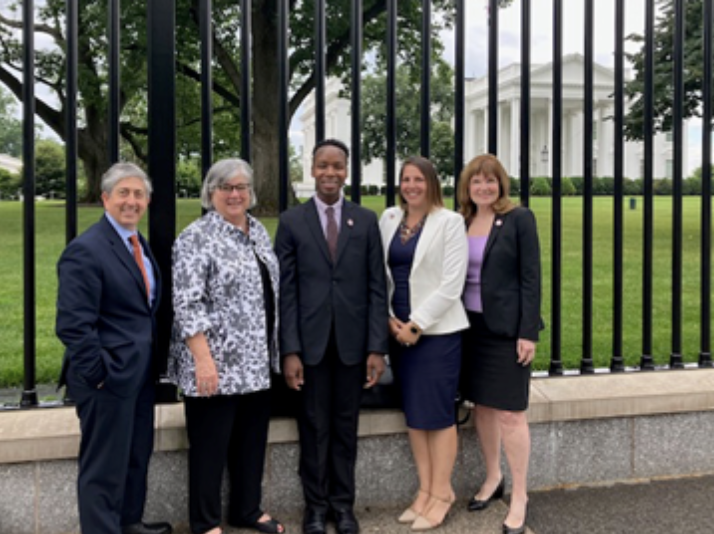Nursing Advocacy Creates Real Change in Health Policy
Advocacy is a pillar of nursing (https://www.nursingworld.org/practice-policy/advocacy/). Nurses instinctively advocate for their patients, in their workplaces, and in their communities, but legislative and political advocacy is no less important to advancing the profession and patient care.
With more than 5 million nurses (https://doi.org/10.1016/S2155-8256(23)00047-9) in the United States, the profession projects a palpable percentage of potentially powerful people. When mobilized, nurses make change at both global and granular levels. Their impact on public health is unmatched, as nurses continue to be the most trusted and ethical profession for more than two decades.

Using that trust en masse and individually, nurses are more energized and engaged than ever in the advocacy community. And ONS advocates have the support of their professional home behind them, because advocacy is an ONS organizational core value (https://www.ons.org/about-ons/ons-leadership/mission-vision-and-values). The Society and its members advocate “on behalf of patients and the profession to ensure respect and recognition, access to education, safe working environments, and fair reimbursement and serve as advocates for public health policy.”
Many an actor has reminded themselves that “it takes 20 years to be an overnight success,” a quip attributed to Eddie Cantor (https://en.wikipedia.org/wiki/Eddie_Cantor), but it applies to advocates, too. That is almost as long as ONS has been working diligently in the trenches, representing patients and the profession in congressional staff meetings or public hearings at federal regulatory agencies and providing information on nursing and cancer policy issues. Advocacy is a marathon, not a sprint. Nurses’ tireless commitment is making a difference.
ONS Advocacy in Action
Joining partners, coalitions, and affiliates in the Society’s own health policy legislative agenda, ONS sends oncology nurses to events in Washington, DC, and in state capitals around the country.
In September 2022, more than 100 ONS members represented their chapters and attended (https://www.ons.org/make-difference/ons-center-advocacy-and-health-policy/advocacy-and-healthy-policy-events) the 7th annual ONS Capitol Hill Days advocacy event. After a full day of health policy education on the political environment, details of the legislation, and training on how to meet with a congressional office, nurses spent day two in Capitol Hill meetings with their U.S. representative and senators. Their passion and personal stories made the case for priority issues like palliative care, oral parity for cancer drugs, Title VIII funding, Cancer Moonshot, smoking cessation, and reimbursement for critical lymphedema supplies.
Because of Hill Days, dozens of members of Congress signed onto key pieces of legislation for the Patient Care and Hospice Education and Training Act (PCHETA) and Cancer Drug Parity Act. Additionally, the Lymphedema Treatment Act was passed, in part because oncology nurses took the lead in elevating the need for compression garments to be covered for cancer survivors. By providing both the supportive evidence and emotional patient experience, nurses made the case for bipartisan support. The bill was signed into law by President Biden in December 2022.
In May 2023, 14 ONS chapters in California created their own ad hoc committee on advocacy and organized the inaugural ONS California Advocacy Summit (https://allevents.in/mobile/amp-event.php?event_id=200024465854039). They spent a day in Sacramento meeting with their state elected officials and pushed for passage of three specific bills: a statewide cancer registry for data, a human papillomavirus vaccine requirement, and biomarker testing coverage. As of this summer, those bills are making their way through the chambers with bipartisan support.
Stronger Together
Other groups also seek out ONS as the expert voice of the oncology nurse for their meetings. Partnering with the American Cancer Society’s Cancer Action Network, ONS members have spoken to several state legislatures, including Georgia, Kentucky, New York, and Utah, on the need for biomarker testing insurance coverage (https://www.fightcancer.org/what-we-do/access-biomarker-testing). Hearing from nurses changes hearts and minds and can push a lawmaker into the support column.
Back in DC, ONS also sent oncology nurses to Capitol Hill with another alliance partner, the Patient Quality of Life Coalition (PQLC). Joining more than 50 other advocates, ONS members explained with a nurse’s perspective that palliative care is a team-based approach to relieve pain and suffering and provide “an extra layer of support at any age or stage (http://patientqualityoflife.org/our-goals-accomplishments/)” of a diagnosis. Because ONS members aggressively pushed the bill forward, PQLC got congressional support to bolster PCHETA.
ONS Perspective
Aside from the American Nurses Association (ANA), few other national nursing membership associations are as committed to activism as ONS. That aggressive stance isn’t for all nurses, and that’s okay. Some prefer to toil quietly and send in messages of support to their elected officials, and those nurses still serve a much-needed role.
But others are really interested in getting their hands dirty, perhaps even thinking about running for office themselves. A new organization called Healing Politics is specifically encouraging nurses to consider being more politically involved, regardless of party affiliation. Its motto is, “Don’t just march. Run for something (https://healing-politics.org/).” Part of its mission is to have more nurses elected to political office to help influence public policy, precisely because of their professional expertise.
Four ONS members attended a Healing Politics program in May 2023 (https://mailchi.mp/3f07284f4a2d/welcome-to-healing-politics-9309218) and received an education in the gritty nature of campaign management. They said that the experience was eye opening and that they learned that running for office is not merely throwing a proverbial hat in the ring. Successful campaigns require time, energy, people, and money, and those nurses gained a greater appreciation for the process and how politicians think and act after attending. And that information makes each nurse a better advocate for change.
Advocacy is essential to the nursing profession. Learn how to join ONS’s advocacy network (https://www.ons.org/make-difference/get-involved?ref=RO) and make a real difference for patients and peers. Long journeys begin with small steps.
